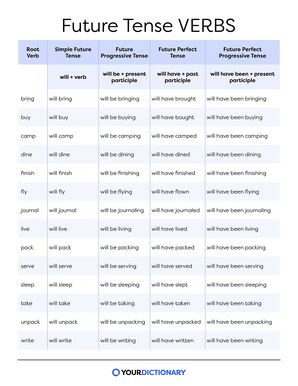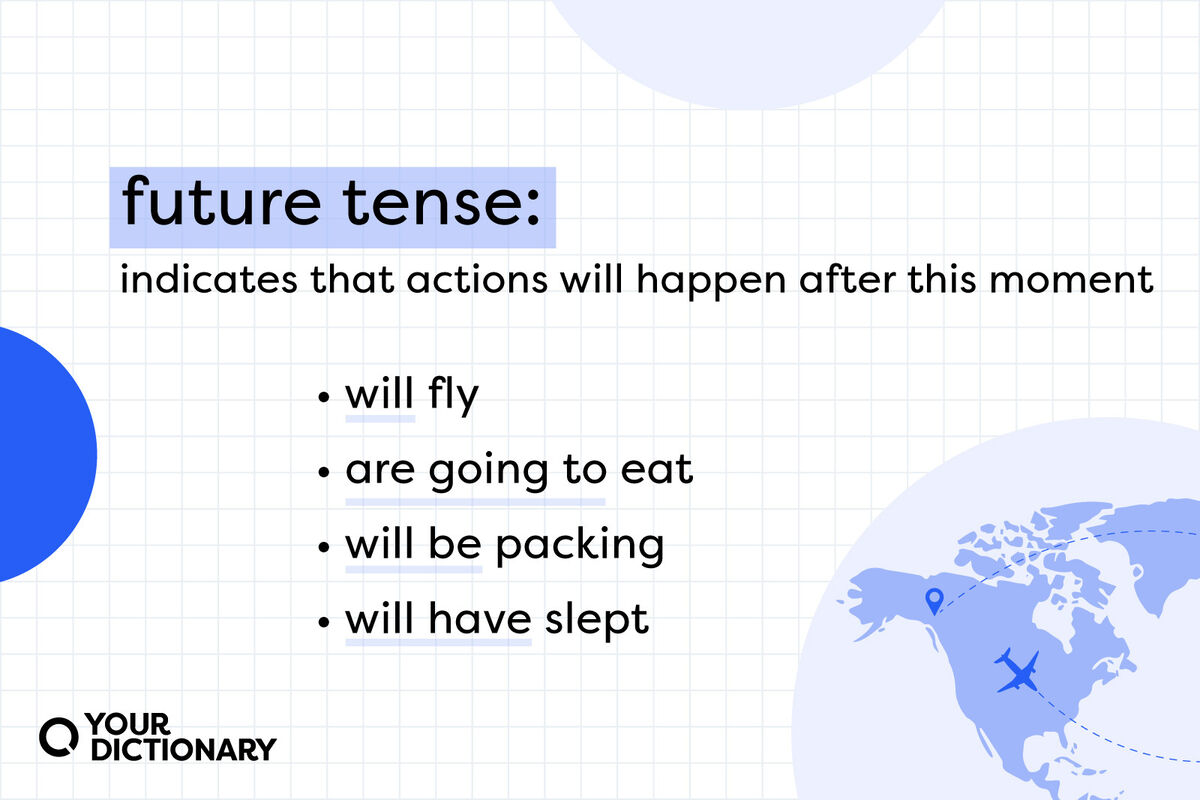

Grammarians aren’t psychic, but they can still figure out what’s going to happen in the future. And as a matter of fact, so can you! It’s all about finding the future tense verb in a sentence. Still stuck in the present tense? Just remember: Where there’s a will, there’s a way.
What Are Future Tense Verbs?
Future tense verbs show something that is going to happen in the future. They’re not happening now, as in present tense, and they haven’t happened before, as in past tense. They will happen sometime after this moment. (Did you catch the future tense verb in that sentence?)
Examples of future tense verbs include:
- I will graduate from high school this spring.
- Mark will visit his best friend next Tuesday.
- My wife is going to speak to our neighbors about the fence.
- The governor announced that he will leave his position.
- She will practice all week for the upcoming concert.
List of Future Tense Verbs
If you need a helpful list of future tense verbs, download a handy chart for quick reference.

How To Form Future Tense Verbs
For the most part, forming future tense verbs is simple.
- Add the modal verb will before a verb in both formal and informal writing.
I will travel to Greece tomorrow. - Add the helping verb is/am/are and going to before a verb in informal writing.
I am going to travel to Greece tomorrow.
You may also see shall in the future tense (I shall travel to Greece tomorrow). But shall is more popular in formal writing and British English, and should only be used with first-person sentences. Depending on which of the four forms of the future tense you’re using, it’s best to go with will or going to.
Simple Future Tense Verbs
The simple future tense shows that an action will begin and end in the future. Unlike other simple verb tenses, there’s no need to conjugate or change the spelling of simple future tense verbs.
It doesn’t even matter if the verb is regular (doesn’t change spelling in other tenses) or irregular (does change spelling in other tenses) — just add will or going to in front of the verb.
|
Simple Future Tense Formula |
Example Sentences |
|
will + verb |
We will fly to Santorini She will journal about the trip. |
|
to be + going to + verb |
I am going to dine with friends. They are going to eat lamb and rice. |
Future Progressive Tense Verbs
The future progressive tense (sometimes called the future continuous tense) shows that an ongoing action will take place in the future. Will be or going to be comes before the present participle (verb with -ing) — though will be is the most common way to show future progressive tense.
Note that verbs ending in -e (such as dine) tend to drop their last letter when adding -ing (dining). Also, one-syllable verbs that end in a vowel-consonant combination (such as swim) double their last letter in the present participle (swimming).
|
Future Progressive Tense Formula |
Example Sentences |
|
will be + present participle |
We will be packing for our vacation tonight. He will be bringing the camera and accessories. |
|
is + going to be + present participle |
I am going to be taking the paint supplies. They are going to be running in the marathon. |
Future Perfect Tense Verbs
The future perfect tense expresses an action that will be finished before another action in the future. Add will have or is going to have before the past participle (regular verbs end in -ed or -d; irregular verbs have their own endings).
|
Future Perfect Tense Formula |
Example Sentences |
|
will have + past participle |
We will have finished our first meal by then. After the plane ride, he will have slept for ten hours. |
|
is + going to be + have + past participle |
She is going to have unpacked all their belongings. They are going to have bought every piece of pottery at the local market. |
Future Perfect Progressive Tense Verbs
Future perfect progressive tense expresses that an action that has already started, or will start at a later time, will continue up to a time in the future. It reflects the duration of that ongoing activity.
Usually, future perfect progressive verbs add will have been to the verb’s present participle (-ing), since going to have been is harder to understand, but both forms are technically correct.
|
Future Perfect Progressive Tense |
Example Sentences |
|
will have been + present participle |
By this time next year, we will have been living in Santorini for 11 months. He will have been writing for over a decade. |
|
is + going to be + have been + present participle |
The restaurateur is going to have been serving the public for 15 years. They are going to have been traveling for the majority of their lives. |
Using Future Tense Verbs in Informal Writing
Does “I will have been studying the future tense” sound a little stiff and formal? Feel free to shorten the will in your future tense sentences into contractions when writing or speaking informally.
- I will enjoy my trip.
- I’ll enjoy my trip.
- You will be eating at the hotel.
- You’ll be eating at the hotel.
- They will have been sightseeing for an entire week.
- They’ll have been sightseeing for an entire week.
Note that while this contraction works best with pronouns. You may hear it with a person’s name in informal conversation or written dialect (“Mark’ll enjoy his trip”), but it’s not considered standard grammar.
How Do You Make Future Tense Verbs Negative?
It’s all well and good to talk about what will happen in the future, but what about what’s not going to happen? It’s as simple as adding the word not (or contraction won’t or isn’t) into your future tense sentence.
- Simple future tense: “He will eat” becomes “He will not eat.”
- Future progressive: “He is going to be eating” becomes “He isn’t going to be eating.”
- Future perfect: “He will have eaten” becomes “He won’t have eaten.”
- Future perfect progressive: “He will have been eating” becomes “He won’t have been eating.”
Future Tense Verbs in Questions
We all have questions about the future. When you want to ask one, change the order of your future tense sentence to put the modal or helping verb (will or is/are/am) first, then the subject, then have, have been, or going to.
- Simple future tense: “You will exercise” becomes “Will you exercise?”
- Future progressive: “You are going to be exercising” becomes “Are you going to be exercising?”
- Future perfect: “You will have exercised” becomes “Will you have exercised?”
- Future perfect progressive: “You will have been exercising” becomes “Will you have been exercising?”
Future Tense Verb Quiz
Choosing the correct form of the future tense can tell a reader a lot about the time period of the sentence. Can you identify each future tense verb form here?
- Oscar will be traveling to Australia next year.
- He will visit his good friends Paola and Marcus.
- They’ll have been waiting for this trip for a long time.
- Oscar will have toured New Zealand and France before he arrives.
- By then, he’ll have been working at his job for five years.
- Oscar is going to enjoy his trip.
Answer Key for Future Tense Verb Quiz
Could you correctly identify each future tense verb form?
- Oscar will be traveling to Australia next year. (Future progressive)
- He will visit his good friends Paola and Marcus. (Simple future tense)
- They’ll have been waiting for this trip for a long time. (Future perfect progressive)
- Oscar will have toured New Zealand and France before he arrives. (Future perfect)
- By then, he’ll have been working at his job for five years. (Future perfect progressive)
- Next, Oscar will be flying to Japan. (Future progressive)
Verb Tenses for Every Occasion
Thanks to the depths of language, we can express ourselves in the past, present, and future tense with clarity. The future tense is particularly interesting because we can plan upcoming events with mild specificity or great detail. Ready to dive into the past and further explore the present? Explore these categories of English verb tenses for all the details.